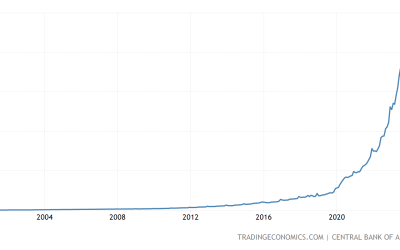When people talk of a “price level,” they have in mind the image of a level of a liquid which goes up or down according to the increase or decrease in its quantity, but which, like a liquid in a tank, always rises evenly. But with prices, there is no such thing as a “level.” Prices do not change to the same extent at the same time. There are always prices that are changing more rapidly, rising or falling more rapidly than other prices. There is a reason for this.
Consider the case of the government employee who received the new money added to the money supply. People do not buy today precisely the same commodities and in the same quantities as they did yesterday. The additional money which the government has printed and introduced into the market is not used for the purchase of all commodities and services. It is used for the purchase of certain commodities, the prices of which will rise, while other commodities will still remain at the prices that prevailed before the new money was put on the market. Therefore, when inflation starts, different groups within the population are affected by this inflation in different ways. Those groups who get the new money first gain a temporary benefit.
When the government inflates in order to wage a war, it has to buy munitions, and the first to get the additional money are the munitions industries and the workers within these industries. These groups are now in a very favorable position. They have higher profits and higher wages; their business is moving. Why? Because they were the first to receive the additional money. And having now more money at their disposal, they are buying. And they are buying from other people who are manufacturing and selling the commodities that these munitions makers want.
These other people form a second group. And this second group considers inflation to be very good for business. Why not? Isn’t it wonderful to sell more? For example, the owner of a restaurant in the neighborhood of a munitions factory says: “It is really marvelous! The munitions workers have more money; there are many more of them now than before; they are all patronizing my restaurant; I am very happy about it.” He does not see any reason to feel otherwise.
The situation is this: those people to whom the money comes first now have a higher income, and they can still buy many commodities and services at prices which correspond to the previous state of the market, to the condition that existed on the eve of inflation. Therefore, they are in a very favorable position. And thus inflation continues step by step, from one group of the population to another. And all those to whom the additional money comes at the early state of inflation are benefited because they are buying some things at prices still corresponding to the previous stage of the exchange ratio between money and commodities.
But there are other groups in the population to whom this additional money comes much, much later. These people are in an unfavorable position. Before the additional money comes to them they are forced to pay higher prices than they paid before for some–or for practically all–of the commodities they wanted to purchase, while their income has remained the same, or has not increased proportionately with prices.
Consider for instance a country like the United States during the Second World War; on the one hand, inflation at that time favored the munitions workers, the munitions industries, the manufacturers of guns, while on the other hand it worked against other groups of the population. And the ones who suffered the greatest disadvantages from inflation were the teachers and the ministers.
As you know, a minister is a very modest person who serves God and must not talk too much about money. Teachers, likewise, are dedicated persons who are supposed to think more about educating the young than about their salaries. Consequently, the teachers and ministers were among those who were most penalized by inflation, for the various schools and churches were the last to realize that they must raise salaries. When the church elders and the school corporations finally discovered that after all, one should also raise the salaries of those dedicated people, the earlier losses they had suffered still remained.
For a long time, they had to buy less than they did before, to cut down their consumption of better and more expensive foods, and to restrict their purchase of clothing–because prices had already adjusted upward, while their incomes, their salaries, had not yet been raised. (This situation has changed considerably today, at least for teachers.)
There are therefore always different groups in the population being affected differently by inflation. For some of them, inflation is not so bad; they even ask for a continuation of it because they are the first to profit from it. We will see, in the next lecture, how this unevenness in the consequences of inflation vitally affects the politics that lead toward inflation.
Under these changes brought about by inflation, we have groups who are favored and groups who are directly profiteering. I do not use the term “profiteering” as a reproach to these people, for if there is someone to blame, it is the government that established the inflation. And there are always people who favor inflation, because they realize what is going on sooner than other people do. Their special profits are due to the fact that there will necessarily be unevenness in the process of inflation.
This article is serialized from Economic Policy: Thoughts for Today and Tomorrow, a book based on six lectures delivered in Buenos Aires in 1959 on Capitalism, Socialism, Interventionism, Inflation, Foreign Investment, and Politics and Ideas by the great 20th century economist who was too good to receive a Noble Prize: Ludwig von Mises (1881-1973). Copyright 1995 by Bettina Bien Greaves. All rights reserved.




